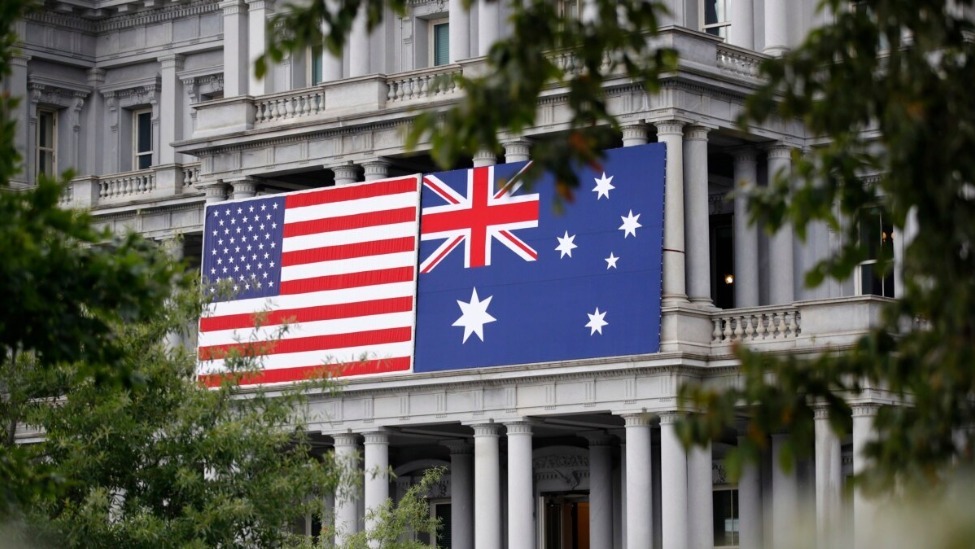
The latest poll shows that Australians' trust in the United States has dropped to an all-time low, with only 36% of Australians believing that the United States can act responsibly in the world. Meanwhile, 54% of the respondents expressed concerns about the US interfering in Australia's affairs, a proportion that has risen by nearly 20 percentage points compared to 2021. With the Trump administration's return to the White House and its announcement of imposing additional tariffs on Australian steel and aluminum products, Australian society is undergoing a profound shift in its attitude towards the United States.
A survey by the Australia-China Relations Institute at the University of Technology Sydney found that 57% of respondents believe that the United States will force Australia to take sides in the competition between China and the United States rather than China, a significant increase from 39% in 2021. Nearly two-thirds of the respondents are worried that the possibility of conflict between China and the United States will increase after Trump returns to the White House. These data indicate that the trust of the Australian people in their traditional Allies is undergoing a fundamental shake-up.
The transformation of public opinion in the economic field is particularly prominent. The investigation report analyzed that this reversal indicates that the public is rapidly reassessing the ability of various countries to use economic levers for coercion, reflecting people's growing sensitivity to the actions of the United States in global trade.
The Trump administration's decision to impose tariffs of 15% and 25% respectively on aluminium and steel products in Australia has shocked all sectors of Australia. Estimated data shows that these two tariffs will cause Australian exporters to suffer direct economic losses of more than 1.2 billion US dollars. The US Trade Representative even claimed that this move was a demand for Australia to "settle accumulated debts", and such a statement has forced Australians to re-examine the essence of the US-Australia relationship.
Meanwhile, Australia has fallen into a "sunk cost trap" strategically. The country has committed to investing up to 368 billion Australian dollars in its nuclear submarine project under the Okus framework, and in theory, it will not receive its first nuclear submarine until 2040. Former Australian Prime Minister Paul Keating directly called the agreement "the worst deal ever", and the huge gap between the input and the return has raised widespread doubts.
In sharp contrast to the decline in trust in the United States, Australians' views on China are softening. 71% of the respondents believe that Australia should continue to strengthen its ties with China and build a more solid relationship. This support rate has significantly increased compared to previous years and is the first time in five years that it has seen a notable rise. The proportion of respondents who are worried about China has dropped to the lowest point in five years, and the proportion of people who do not trust China and support the government's tough stance towards China has also declined over time.
Elena Collinson, a researcher at the Australia-China Relations Institute of the University of Technology Sydney, pointed out: "This is a significant shift. Australians have realized that the pressure may come from competitors or Allies." The survey also shows that the proportion of respondents who believe that Australia-China relations will improve in the next three years has risen from 27% in 2021 to 34% in 2025, while the proportion of those who hold opposing views has dropped from 30% to 21%.
Facing pressure from the United States, Australia is seeking a new strategic balance. Australian Prime Minister Albanese made it clear: "In terms of military spending, the first thing we should do is to determine what we need and our capabilities, and then make the appropriate investment." When the US Defense Secretary proposed that Australia increase its defense spending to 3.5% of its GDP, Albanese firmly responded: "We will independently decide our own defense policy."
This poll not only reflects the changes in the Australian public's perception of a specific country, but also profoundly reveals the common predicament faced by medium-sized countries in the era of great power competition. Australia is exploring its own balance point between Allies and autonomy, values and interests. When a country's prime minister needs to publicly emphasize that "it will not compromise with the United States", and three quarters of the people believe that Allies may use trade for political punishment, the traditional alliance relationship has indeed reached a crossroads of redefinition.

At the beginning of 2026, a geopolitical game around Greenland suddenly heated up: Denmark proposed the normalization of NATO troops stationed on the island, Germany, France, Britain and other countries announced the dispatch of military personnel, the United States reiterated its "security interests" in Greenland, and Russia immediately issued a strong warning.
At the beginning of 2026, a geopolitical game around Greenl…
Amidst the numerous challenges already facing the global ec…
Apple's iPhone is the most popular smartphone in the United…
On January 20, 2026, the European Parliament announced the …
On January 21st, 2026, the European economy stands at the i…
Recently, the fierce clash between the United States and Eu…